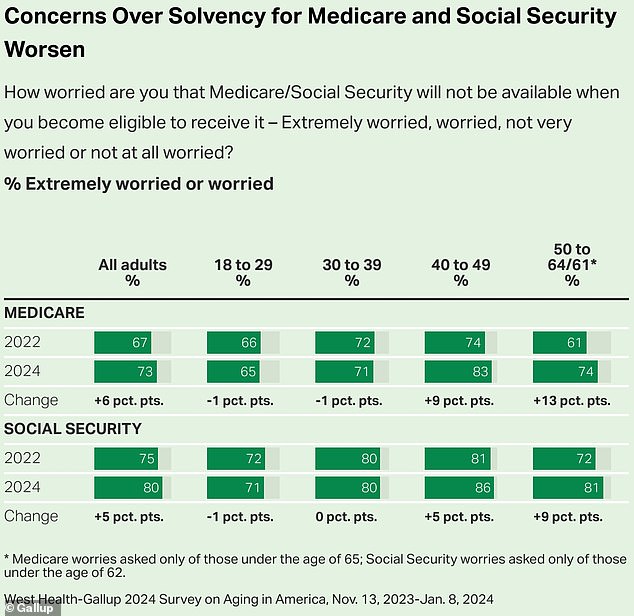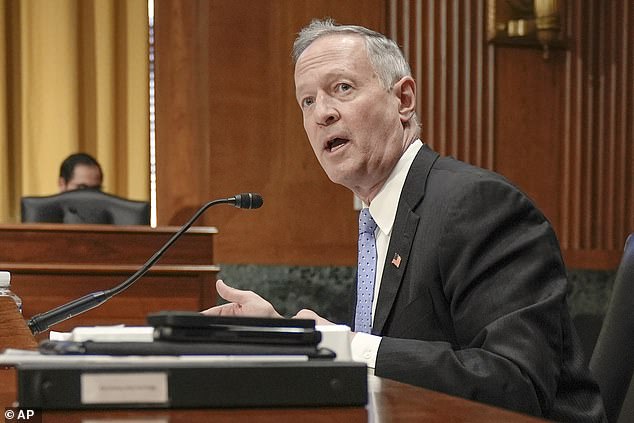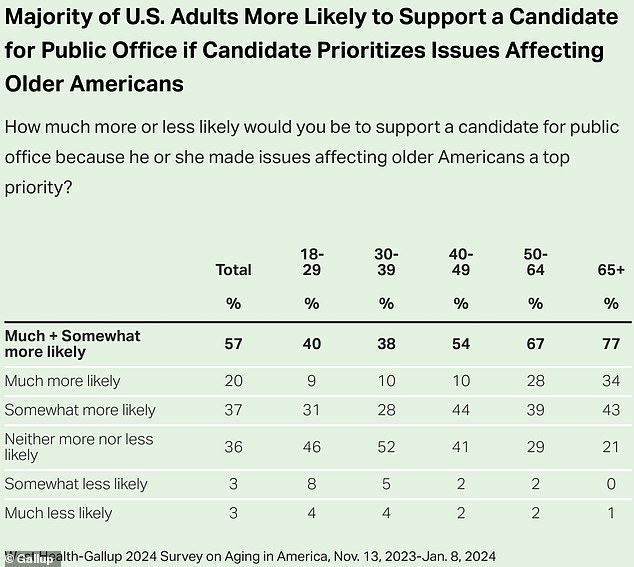Americans are increasingly alarmed that Medicare and Social Security will collapse when they retire, a survey shows.
About three-quarters of adults are “worried” or “extremely worried” about losing state-funded health care during their golden years, pollster Gallup says.
Four-fifths of them fear Social Security will implode, the survey says.
The number of alarmed people has skyrocketed in the past two years, and those approaching retirement age are the most anxious of all.
The survey comes as America’s safety net is crumbling, with an aging population and not enough tax-paying workers to sustain the system.
Surveys show that those closest to retirement are the most worried about their funds running out.

About three-quarters of adults are worried about losing state-funded health care during their golden years, Gallup says.
Recent data shows that funds supporting Social Security and Medicaid could be exhausted in just over a decade.
Fears about cash-strapped retirements were highlighted this week by a 90-year-old U.S. Air Force veteran who pushes shopping carts at a grocery store in sweltering Louisiana to make ends meet.

Dillon McCormick’s $1,100 Social Security payments aren’t enough to retire.
Dillon McCormick’s $1,100 Social Security payments aren’t enough to retire, he says.
Thousands of people donated about a quarter of a million dollars to an online fundraiser to help McCormick leave his demanding job at the Winn-Dixie grocery store in the New Orleans suburb of Metairie.
“Americans don’t take for granted that Medicare and Social Security will always be there for them,” Gallup says.
The pollster says that “older voters, who typically vote at high rates” are the most upset and may vote accordingly in the November election.
“This sentiment could serve as a wake-up call to action” for lawmakers, they said in a report.
Social Security relies on its trust funds to provide monthly benefit checks to about 70 million Americans.
Fears about cash-strapped retirees were highlighted this week by the case of a 90-year-old U.S. Air Force veteran who pushes shopping carts at a grocery store in sweltering Louisiana to make ends meet.

Fears about cash-strapped retirees were highlighted by Dillon McCormick, 90, a U.S. Air Force veteran who pushes shopping carts at a grocery store in sweltering Louisiana to make ends meet.

Social Security Commissioner Martin O’Malley urged Congress to take action to “extend the financial health of the Trust Fund for the foreseeable future.”
Thousands of people donated about a quarter of a million dollars to an online fundraiser to help Dillon McCormick retire from his demanding job at the Winn-Dixie grocery store in the New Orleans suburb of Metairie.
But an aging population is raising the cost of the program as a smaller proportion of people are contributing to it and spending exceeds income.
In what has been called the “silver tsunami,” about 4.1 million Americans will turn 65 in 2024, and every year until 2027, according to a report from the Alliance for Lifetime Income.
An annual report from the Social Security Board of Trustees last month found that Social Security would only be able to pay full benefits for the next 11 years.
Social Security is funded primarily through payroll taxes that are deducted from paychecks and then used to pay retirement and disability benefits.
If the trust funds the Social Security Administration relies on are depleted, that doesn’t mean payments will suddenly disappear.
Instead, trustees say beneficiaries would face cuts to their monthly checks, losing 17 percent of their current benefits.
This could be significant for millions of disabled Americans and those who rely on Social Security for their sole income in retirement.
According to the Peter G. Peterson Foundation, a nonpartisan research group, an automatic 21 percent cut will affect all recipients in just nine years.
That’s almost $17,000 a year for the average couple, according to a new report.
Michael Peterson, the group’s executive director, warned that Social Security “is on a rapid path to insolvency.”
“Voters want leaders to prioritize solutions to avoid devastating cuts to this essential program,” he added.
Meanwhile, Medicare, which provides health insurance to people 65 and older, will see its reserves depleted by 2036, the researchers said.
This is due in part, according to the report, to higher payroll tax revenues and lower-than-projected expenses for 2023.

Social Security relies on its trust funds to provide monthly benefit checks to about 70 million Americans.

Fear of going broke in retirement could affect how people vote in November
The uncertain path of Social Security and Medicare has been a concern for many, particularly those nearing retirement age.
73 percent of all adults worry that Medicare will disappear in the next few years, and 80 percent feel the same about Social Security, Gallup polling shows.
The survey found that voters are 57 percent more likely to back a political candidate who prioritizes older Americans’ budgets in an election.
The nationwide survey of 5,149 adults was conducted between November 2023 and January 2024.
The financial prospects of the Social Security system have long been a point of political contention.
Republicans have suggested raising the retirement age, while Democrats have offered raising the payroll tax threshold as a possible solution.
Some experts warn that politicians are running away from the problem rather than trying to solve it, and it is crucial that they act now.
Earlier this year, billionaire CEO Larry Fink said Americans should work past age 65 to prevent the collapse of the Social Security system.
“No one should have to work longer than they would like,” Fink wrote in his 2024 letter to shareholders.
“But I think it’s a little crazy that our main idea about the proper retirement age (65) has its origins in the time of the Ottoman Empire.”
Social Security Commissioner Martin O’Malley urged lawmakers to act now to shore up the drained trusts.


